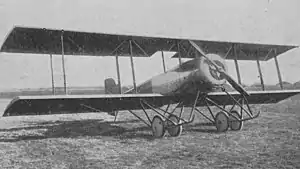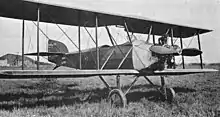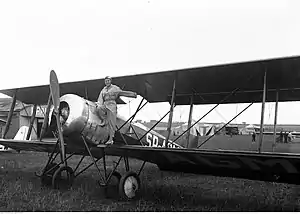Hanriot HD.14
The Hanriot HD.14 was a military trainer aircraft produced in large numbers in France during the 1920s. It was a conventional, two-bay biplane with unstaggered wings of equal span. The pilot and instructor sat in tandem, open cockpits, and the fuselage was braced to the lower wing with short struts. The main units of the fixed tailskid undercarriage were divided, each unit carrying two wheels, and early production examples also had anti-noseover skids projecting forwards as well.
| HD.14 | |
|---|---|
 | |
| Role | Trainer |
| National origin | France |
| Manufacturer | Hanriot |
| First flight | 1920 |
| Primary users | Aéronautique Militaire Imperial Japanese Army Air Force, Polish Air Force, Soviet Air Force |
| Number built | ca. 2,100 |
In 1922, production shifted to a much improved version, known as the HD.14ter or HD.14/23. This featured a smaller wing area, and revised tail fin, interplane and cabane struts, and fuselage cross-section. The landing gear track was narrowed in order to facilitate the aircraft's loading onto the standard army trailer of the day.
Incredibly prolific (the Aéronautique Militaire alone operated 1,925 examples), it was also licence-produced by Mitsubishi in Japan, where another 145 were built, and by the CWL and Samolot in Poland, where respectively 125 and 120 were built (designated locally as H.28).
Variants
- HD.14 - Original production version. Also known as the HD.14 EP2.
- HD.14ter - Improved version of 1922. Also known as the HD.14/23.
- HD.14S (Sanitaire) - Air ambulance version
- HD.141 - Remanufactured ex-Army HD.14s for French aeroclub use
 Hanriot H.410 E.P.2 photo from L'Aéronautique June,1928
Hanriot H.410 E.P.2 photo from L'Aéronautique June,1928 - H.410 - A 1928 development with Lorraine 5-cyl radial and revised undercarriage.[1]
- H.411 - development of the HD.410[2]
- LH.412 - development of the HD.410[3]
- H.28 - Polish designation of license-produced slightly modified HD.14/23[4]
- 己 1 (Ki 1) - Japanese Army designation of the Hanriot HD.14 built under licence by Mitsubishi
Operators

- Imperial Japanese Army Air Force (145, licence-built by Mitsubishi)
- Polish Air Force (295, including 245 licence-built H-28)[4]
- Soviet Air Force (30)
Specifications (HD.14, early production)
General characteristics
- Crew: Two, pilot and instructor
- Length: 7.26 m (23 ft 10 in)
- Wingspan: 10.87 m (35 ft 8 in)
- Height: 3.00 m (9 ft 10 in)
- Wing area: 34.5 m2 (370 sq ft)
- Gross weight: 810 kg (1,786 lb)
- Powerplant: 1 × Le Rhône 9 , 60 kW (80 hp)
Performance
- Maximum speed: 110 km/h (68 mph, 59 kn)
- Range: 180 km (112 mi, 97 nmi)
- Service ceiling: 4,000 m (13,125 ft)
References
Bibliography
- Taylor, Michael J. H. (1989). Jane's Encyclopedia of Aviation. London: Studio Editions. p. 470.
- World Aircraft Information Files. London: Bright Star Publishing. pp. File 896 Sheet 11.
- Kotelnikov, V.; Kulikov, V. & Cony, C. (December 2001). "Les avions français en URSS, 1921–1941" [French Aircraft in the USSR, 1921–1941]. Avions: Toute l'Aéronautique et son histoire (in French) (105): 50–56. ISSN 1243-8650.
- Morgała, Andrzej (2003). Samoloty wojskowe w Polsce 1924-1939 (in Polish). Warsaw: Bellona. ISBN 83-11-09319-9.
- Nelcarz, Bartolomiej & Peczkowski, Robert (2001). White Eagles: The Aircraft, Men and Operations of the Polish Air Force 1918–1939. Ottringham, UK: Hikoki Publications. ISBN 1-902109-73-2.